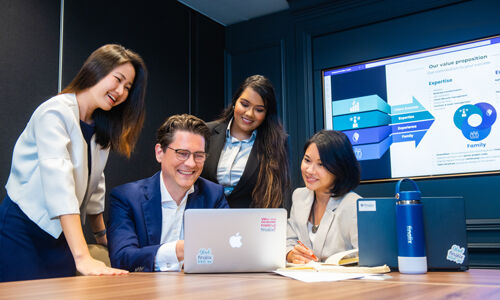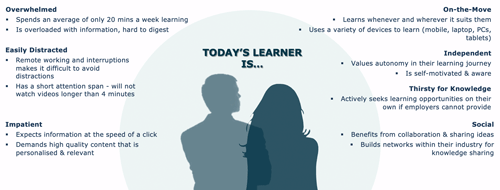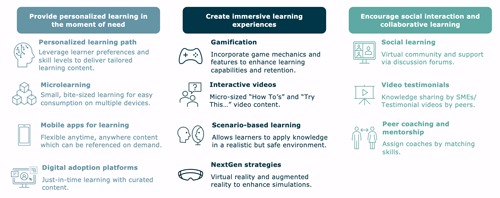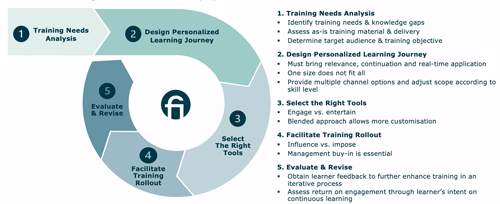Why Training Plays a Crucial Role in Banking
The banking industry is undergoing a significant transformation due to changes in technology and customer behavior. This transformation impacts traditional banking models and requires organizations to adapt to remain competitive.
Training plays a crucial role in transformation phases, equipping employees with the knowledge and skills needed to navigate the changing landscape. Banks must motivate employees to continuously upskill and reskill to enhance their value and stay relevant. This article explores the evolving needs of today’s learners and provides insights on how banks can engage these learners using innovative and flexible training methods.
Recognizing the importance of continuous learning, countries like Singapore strive to upskill their workforce with government-initiated programs like SkillsFuture. These subsidized training courses, offered by industry experts, aim to enhance skill proficiency, knowledge, and expertise for all citizens.
finalix is proud to offer three SkillsFuture-eligible courses in collaboration with the Singapore Management University (SMU) Academy:
Providing insights into the EAM and FO industry, focusing on market opportunities, challenges, and innovation in Asia.
Understanding AML regulations, legal frameworks, and high-risk areas through real-world case studies to build effective AML programmes.
Navigating sustainability regulations and creating client-centric investment strategies, learning from Europe's experiences and challenges.
Transformation in Banking
Change is the only constant in the banking industry. In recent years, advancements in technology such as Artificial Intelligence, the push for mass adoption of mobile banking during the COVID-19 pandemic, and global shifts in the regulatory spotlight to ESG and AML, driven by political and social influences have resulted in a change in the behavior and expectations of clients of banks.
To remain relevant and competitive, banks must embrace new technology, innovation, and agility, to ensure their workforce has the knowledge and skills needed to stay ahead.
Investing in training during change management can benefit both employees and the organization. For employees, training can help them stay relevant and engaged in their work. It shows employees that they are valued. For the organization, training can improve productivity, adoption of new tools, products, and processes, and employee satisfaction.
From the Learner’s Lens
Training must be integrated into change management and supported by a comprehensive people and communications strategy.
In a rapidly evolving workplace, personalized training paths become essential. Advancements in technology and connectivity have transformed the way employees seek and consume knowledge. Recognizing and adapting to these changes is key to designing an effective training strategy that aligns with the preferences of today’s learners.
(Click on the image to enlarge)
Training Methods
Various training methods can be used, each with its own merits. In some instances, a combination of methods works best:
- Classroom training: Traditional, instructor-led sessions are effective for developing soft skills or learning project and collaboration methodologies. These sessions provide opportunities for direct Q&A; interactive and practical exercises and peer-sharing of experiences.
- E-learning: Digital platforms offer flexible, cost-effective training solutions that employees can access at their convenience.
- Gamification: Incorporating game-like elements can make training more engaging and interactive. This is especially effective with topics like compliance training, where employees need to retain a lot of information.
An effective training strategy should leverage these methods to create immersive and engaging experiences that can capture and retain attention.
(Click on the image to enlarge)
Conclusion
The transformation in banking is a complex and ongoing process that requires organizations to adapt to remain competitive. Training plays a crucial role in the process of change management, especially in two respects: On one hand, it provides employees with knowledge and skills to navigate the evolved environment impacted by change projects. On the other hand, it improves skills to become drivers of change.
Expert Insights and Support
At finalix, we bring extensive expertise in managing transformation projects, with training as an important pillar of related change management. Our approach involves identifying the scope, audience, and tools necessary to create effective learning journeys.
(Click on the image to enlarge)
In some of our core business areas, we also offer specialized training, blending practical project experience with theoretical knowledge, ensuring that participants gain valuable insights and skills applicable to their roles.
- Reach out to This email address is being protected from spambots. You need JavaScript enabled to view it. to learn more about our training offerings with SMU and how we can support your transformation journey.














